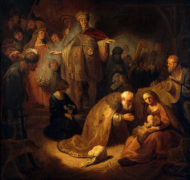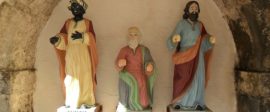Christmas Scriptures: Little Saints: Matthew 2 Sermon Notes
Sermon Notes / Produced by The High Calling
Gifts. Perhaps most of our concern, energy, financial resources at Christmas involve the selection, purchase, and giving of gifts. Often this concern is intensified by trying to find and present the “perfect” gift. In addition, we are often anxious about the level of holiday or seasonal sales and the implications for economy, our economic well-being.
Much of the tradition of gift giving at Christmas perhaps was formed or certainly influenced by the tradition, story of St. Nicholas, Bishop of Myra who secretly gave small gifts, and certainly that of the magi. (this might be the place to show the Rembrandt painting of the Magi’s gifts, above.)
Their gifts after the birth of Jesus often give spiritual legitimacy to our more personal giving. “Opening their treasure chests,” their gift of gold certainly reinforces the tradition of generosity or extravagance in Christmas gift giving. Frankincense and myrrh perhaps reinforce the tradition of meaningful gifts.
Churches and other organizations often capitalize on the Christmas tradition (and perhaps our conflicted feelings or simply the generosity of Christians) and encourage special gifts to missions, to the church. “What gift will you bring to Jesus this year?” And there are popular, sentimental poems or Christmas greetings that emphasize giving what we can.
Convinced that God cares about the product of our work, that a robust theology of work includes the things that come from what we do, then perhaps we can see all of our work as a gift to be offered to God. Perhaps a grand notion of honoring God with the outcome of our work can be identified at Christmas in a way that permeates the rest of the calendar.
A French Christmas tradition from Provence provides a vivid, simple image that can be helpful. Much of the understanding of a spirituality of work has focused on the manner in which we work from ethics or the caring way we treat those with whom we work; they will “know we are Christians by our love,” a witness—our lives consistent with our words.
Text: Matthew 2:11. See also, Romans 12:1, Ephesians 4:7, Colossians 3:17
Focus: God is interested in and designed us for the intrinsic value or product of our work. Whatever we do or produce that is consistent with God’s creative and recreative purposes is ordained by God. It is part of our calling. As we offer ourselves to God, we offer what is produced from our skills, talents.
Introduction: Tradition of the Santons
During the French Revolution, churches were not allowed to erect their traditional nativity displays. Families in Provence began to make their own nativity displays, necessitating small objects that could fit on a table in a home. Initially the traditional nativity figures were formed: Mary, Joseph, baby Jesus, then shepherds, wise men. Eventually other figures representing the ordinary people of a Provence village were added, each dressed in their work clothes, bringing the product of their trade or role. In the crèche scene, they had equal importance to the shepherds and wisemen. Ultimately 55 different santons were formed.
At the nativity, you can see the fisherman, the baker, basket maker, vegetable merchant, cheese vendor, scissors grinder, wine grower, a humble woman with handful of scavenged sticks, each bringing the product of their work to the infant Jesus. It also included a Gypsy woman with tambourine, dancers, the mayor, policeman, and midwife bringing symbols representing their trade. Each a celebrated gift alongside the gold, frankincense and myrrh.
(Visuals of some of the santons would be very helpful, vivid at this point. Google “santons of Provence” for images and additional information).
These figures came to be known as “santons,” meaning “little saints.”
The theological point: Each person a saint, by baptism, confession of faith, a follower of Jesus offering who we are and what we do.
This French tradition reminds us that we each have a role in the recognition and worship of the Messiah. Our worship includes bringing to Jesus our unique roles, skills, and their product at Christmas and throughout the year. In that way the worship of Christmas is perpetual.
A. What are the Trades, Occupations of this community, church
Recognize and affirm the gifts that others bring to the well-being of the local community. By affirming the particular assortment of trades, professions, experience of members of our community, we can more comfortably see our own gifts offered to Christ.
1. Brief overview of the kinds of work done by people within the community or church. How does the community benefit?
2. If this church were required to remove the traditional visitors to the nativity scene and replace them with contemporary equivalents, who would be the magi, sheep herders?
3. If you were invited to come to the manger, what product or procedure from your work could you bring? Your work may be something from your role, not limited to your employment, e.g., parenting, grandparenting, social or community service, student, etc. If currently unemployed and not actively volunteering, what would you have brought in past or see yourself bringing in the future?
B. The Theological Significance of Our Work, and Our Work as Gift To Be enjoyed and Employed
1. From Genesis 1 and 2, we are to exercise dominion, stewardship, till the soil. The first commandment given to humans is work. God purposes through us in a countless variety of ways. In the New Creation, we are called to carry out Christ’s continuing work of reconciling all things to Christ. Genesis 1:28-29 often referred to as the Cultural Mandate.
This includes both the manner and product of our work.
2. Typically we tend to think of our work in utilitarian terms—what by-product of our work can we offer to God, (e.g., the financial benefits given to explicit Christian enterprise, providing opportunities for evangelism, bringing Christian values into our social fabric.)
While each of these utilitarian purposes is consistent with the Christian message, gospel, and have an important role in living out our identity as Christians, there is also, a perhaps more basic, profound purpose.
3. Work has intrinsic value. God the creator, redeemer, sustainer is a worker (See God The Worker, by Robert Banks, Judson). Made in the image of God, we are given the responsibility, privilege of reflecting that image, and ourselves do creative, redeeming or reconciling, sustaining work.
Work is a basic human need, necessary to live fully human. Tim Keller quotes Dorothy Sayers, “Work is not, primarily, a thing one does to live, but the thing one lives to do. It is, or should be, the full expression of the worker’s faculties . . . the medium in which he offers himself to God” (Every Good Endeavor, Timothy Keller, Dutton 2012).
God created and continues to inspire creativity. Christ redeemed us and continues to do the work of “reconciling the world to himself,” redeeming and renewing the broken pieces through God’s people into the new creation. The Gospel affirms that the Kingdom of God has come, in Christ and through Christ’s people. In our work, we demonstrate and participate in the ongoing work of God. This work not only expresses God’s authority, but also God’s persistent, inexhaustible love for all and each of us. Through our work, we serve the common good, God’s loving purpose.
God intends us to offer all of our work to God—as participant with God, as part of God’s grand design. We are to do this with all of the grace and mercy, integrity and humility that faithfully represents/models the God in whose image we were created.
4. At Christmas, the Word of God was made flesh. The Logos, the message, became tangible. The Word continues to be expressed by the creating, developing, managing, subduing, stewarding work of those who were created “in the image” of the Word made flesh.
C. Offering your work—as a gift, an act of worship
In Genesis 2:7, created us out of the dust of the ground (out of the clay?), even as the santons of Provence are formed. The santons express to us the value of our work, the contemporary equivalent of the sharpened scissor, the baked bread, beautiful and effective candle, the mayor’s governance.
If you were represented in a santon, what would you be bringing to the manger?
What is the benefit of your work to you? To family? Community? Nation? God?
For some, the product or outcome of your work is so far down the process, removed from your day to day. It is hard to see. Yet, the work you do has benefit. What intrinsic value do you bring?
In what ways is your work creative, making proper use of the natural world, repairing the brokenness of people, helping to renew society to become more as God intended? In what ways do you add value to the “common good”?
Avodah. In the Old Testament, the Hebrew word can mean “work” or “worship” or “service.” So, when we do our work as “unto the Lord,” we are indeed honoring, worshiping God. In addition to church and home, the places of our work can be places where we “serve” God’s greater purposes. (Caution: we do not “worship our work,” but do our work as act of worship.)
Conclusion:
Imagine:
1) Instead of the traditional nativity, fixed or live, with the three kings and shepherds in their costumes, we see members of this congregation coming to a crèche with the products or symbols of their ordinary work, occupations, roles, offering them to the baby Jesus. What would you bring?
2) Tomorrow, going to work, playing your role at home or in the community, think of it as engaging in the honoring and serving of God, offering there your skills, involvement, participation as an act of worship. Perhaps begin the work day in brief, silent prayer, offering what you do to God.
Be a “living santon,” indeed, a “little saint.” Going to work could be experienced as a visit to the manger and to< the empty tomb and to the cross, offering the gift ourselves.
A possible conclusion: Have worshipers come forward to a manger setting bringing something to symbolically represent the product of their work. Or, invite worshipers to write a brief statement identifying the product of their work and place it in the offering.
*****************************************************************************************************
Dave Williamson is former director of Laity Lodge and on the steering committee of the Theology of Work Project.











